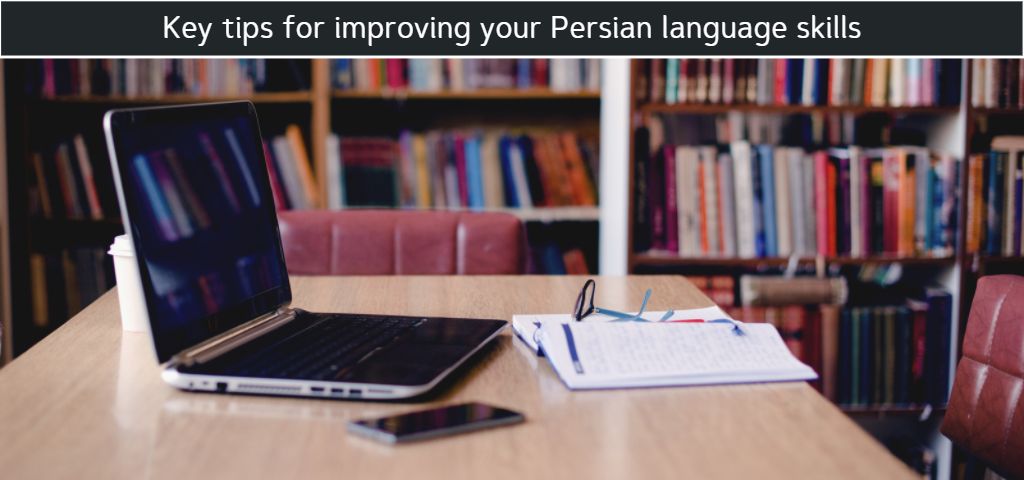
When learning a new foreign language there are four essential skills that are necessary to be able to communicate fully and achieve a complete learning process. These four skills are Speaking, Listening, Reading, and Writing.
Best Farsi Learning Resource!
1. Write fiction in Persian, e.g. short stories

For learners who find writing a diary about things that happen to them every day boring, the best choice is to let your imagination go and write about whatever comes into your mind. The advantage of this is that if you can’t think of how to say something in Persian, you can just change the story to something that is easier to explain. Perhaps the easiest way to start writing fiction in Persian is with a diary, changing any details you like to make it more interesting and funny, and adding more and more fantasy as the weeks go on.
2. Read Books with Translations

With some books you’ll find the translation is written right there, on the opposite page, making your reading experience easier and more enjoyable. This is a great option, as it saves you time pulling out the English-Persian dictionary.
One reason why this is such a wonderful tool is that often just looking up one Persian word isn’t enough for you to really get the feel of the entire text. If you find that you’re reading and re-reading a paragraph or a sentence over and over, and still unclear what you’re supposed to be taking away from it, the translation will quickly clear that up for you to understand better.
Top tips:
- Tips for increasing your Persian vocabulary
- Top 10 Tips to Learn Persian Language Fast
- Top 10 Websites for learning Persian for FREE
- How do you learn Farsi fast?
3. Learn a famous speech or poem in Persian by heart

Although you may never hear or get the chance to say exactly that line, but actually, having one memorable example of a Persian grammatical form in your head can make it much easier and more understandable to learn other examples of the same grammar as you hear them. It is also something you can practice over and over without being as boring as usual grammatical drills.
4. Online chat

The closest thing to speaking for people who don’t have the chance to speak Persian is online chat, as you have to think and respond quickly, and also the language is short and informal just like speech.
5. Read a book with pictures

No, not a picture book–but, again, if you like that, go for it!
In fact, reading books with illustrations helps to make the story really come to life, and also helps to make the characters more real, and the plot more personal. Reading Persian books that have illustrations scattered throughout will help you not only check to make sure you know what’s happening but also help to make what you’re reading stick in your mind more.
6. Remember why you started in the first place

In fact sometimes, in the routine of learning, working, and just living, we can lose sight of our original motivation. Why did you start learning the Persian language in the first place? Reconnecting with this original reason for learning Persian can help you re-discover your motivation and get back on track. Did you start because your family has roots in the Persian language? Is your friend a native Persian speaker? Do you have a trip coming up and you want to be fluent in Persian?
Think back to when you started learning Persian. What made you want to learn this language? What motivated you to start learning Persian?
7. Set challenging but achievable goals

As you know, if you don’t know where you are going, you’ll go nowhere fast. This is true for Persian learning as well. If you don’t know what you want to achieve in this process, your progress will be slow and inconsistent, and harder for you to stay motivated.
Big goals like achieving a new level in the Persian language are just as important as smaller ones like completing a 45-minute lesson or finishing a chapter in a textbook. Make sure that the goals are challenging and also interesting. But most importantly, they should be realistic and achievable. Please avoid setting goals like learning all pronunciation rules in one hour or even one day, or saying you’ll speak fluently after only a month of learning Persian. Actually, setting unrealistic goals will only set you up for failure and demotivate you. You should be kind to yourself. The Persian learning process is a journey, not a destination.
8. Be disciplined, but flexible

Generally, our brains need lots of regular practice to remember things and learn successfully. Creating and following your own personalized language learning routine and plan will not only help you to stay disciplined, but it will also make studying regularly progressively easier. It will become a habit that you won’t even think about – just like how you brush your teeth every night before going to bed or wash your face in the morning, you don’t even think about it. it’s obvious that when something is part of your routine, it requires less mental effort to go and do it.
However, we think it is also important to cut yourself some slack every now and then. There might be days when you can’t study Persian for whatever reason. Please don’t beat yourself up when this happens.
Special Offers!
by: Learn Persian Online Team about (category: Blog)

















What people say about "Key Tips for Improving Your Persian Language Skills"?
No one replied yet.